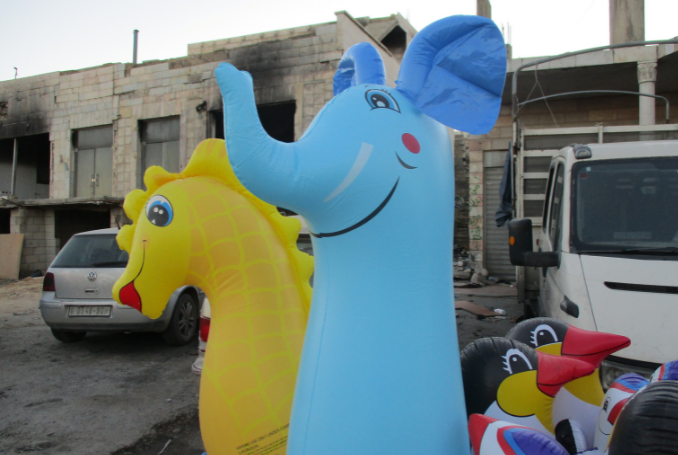How Many Ambulances, How Many Stretchers: Stories from Qalandiya

The toy cart against the background of a burned-out Palestinian home, which, according to eyewitnesses, was destroyed by Israeli soldiers due to its close proximity to the wall. (Photo: Tamar Fleishman, The Palestine Chronicle)
How long does it take for Gaza patients to go back home from a hospital in the occupied West Bank city of Nablus?
How many stretchers do they have to be dragged on after being released from the hospital, despite the fact that their doctors ordered them to lie in bed until their recovery?
How many strangers’ hands have to rummage through their personal belongings without their approval?
At the Qalandiya checkpoint, an ambulance coming from the West Bank had to wait for a long time for another ambulance from East Jerusalem to pick up a Palestinian patient and transfer him.
When the Jerusalem ambulance finally arrived, the medical staff and the patient could not go out right away. They continued to wait quietly and patiently inside the vehicle until the Israeli armed officials approached them and checked their papers and bags.
Only then, the patient was moved from one vehicle to another ambulance, which would bring him to the entrance of the Gaza Strip.
This would not be the final step of his trip. He will be checked again at the Erez checkpoint; there, he will be moved to a Gazan ambulance, and he will only reach his home and family at night.
Making a Living
How hard is it for a friendly, smiling Palestinian man to make a living? A man whose two sons help him with his groceries, a man whose handiwork consists of two poor, loaded carts?
He doesn’t have a vehicle, so he is forced to tie the carts to his body and push them. The front cart is loaded with colorful balloons; the back one, with hot corn-on-the-cob pots.
I saw him as he was slowly making his way to the entrance of the Qalandiya checkpoint, where cars are usually lining up waiting to be checked.
He was speaking to drivers and their family members, hoping that someone would hold out a few shekels in return for a toy or a cup of corn kernels, so that he would be able to put food on the table that night.
(Translated by Tal Haran)
How long does it take for Gaza patients to go back home from a hospital in the occupied West Bank city of Nablus?
How many stretchers do they have to be dragged on after being released from the hospital, despite the fact that their doctors ordered them to lie in bed until their recovery?
How many strangers’ hands have to rummage through their personal belongings without their approval?
At the Qalandiya checkpoint, an ambulance coming from the West Bank had to wait for a long time for another ambulance from East Jerusalem to pick up a Palestinian patient and transfer him.
When the Jerusalem ambulance finally arrived, the medical staff and the patient could not go out right away. They continued to wait quietly and patiently inside the vehicle until the Israeli armed officials approached them and checked their papers and bags.
Only then, the patient was moved from one vehicle to another ambulance, which would bring him to the entrance of the Gaza Strip.
This would not be the final step of his trip. He will be checked again at the Erez checkpoint; there, he will be moved to a Gazan ambulance, and he will only reach his home and family at night.
Making a Living
How hard is it for a friendly, smiling Palestinian man to make a living? A man whose two sons help him with his groceries, a man whose handiwork consists of two poor, loaded carts?
He doesn’t have a vehicle, so he is forced to tie the carts to his body and push them. The front cart is loaded with colorful balloons; the back one, with hot corn-on-the-cob pots.
I saw him as he was slowly making his way to the entrance of the Qalandiya checkpoint, where cars are usually lining up waiting to be checked.
He was speaking to drivers and their family members, hoping that someone would hold out a few shekels in return for a toy or a cup of corn kernels, so that he would be able to put food on the table that night.
(Translated by Tal Haran)
